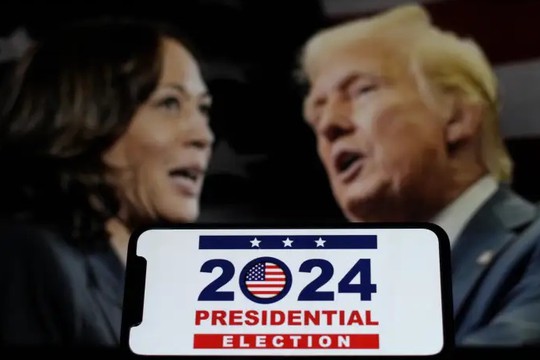Contested election: How a close race with dueling polls creates risk of surprises, delays, and doubts, writes ‘The Washington Examiner’.
Before President Joe Biden abandoned his reelection bid in July, there was a broad consensus about where the 2024 race for the White House was headed. Former President Donald Trump was going to win and Biden was about to lose, with the only remaining questions involving the margin of victory and how many downballot Democrats the incumbent was going to drag down in defeat with him.
Even then, there were still occasional reputable public polls that showed Biden with a fighting chance. An NPR-Marist survey released after the fateful June 27 debate actually showed the soon-to-be defenestrated Democrat leading by 2 percentage points nationally. That was an outlier, but Fox News and NBC News polls that came out around the same time gave Trump leads of 1 and 2 points, respectively, well within the margin of error.
Other polls, including Democratic internals, showed Biden not only losing but jeopardizing his party’s hold on Virginia, New Hampshire, Minnesota, New Mexico, Colorado, and New Jersey while losing the popular vote nationally. That is a bigger collapse of the blue wall that Hillary Clinton experienced in 2016, when Trump was elected the first time.
Since Vice President Kamala Harris replaced Biden at the top of the ticket, Democrats have felt much better about their chances in November. But the consensus about the state of the race has totally collapsed. Wags have dubbed this the “choose your own adventure” election.
Some polls show Harris not only outperforming Biden’s ill-fated reelection campaign but his successful 2020 performance. CBS News and the Democratic Data for Progress have Harris leading by 4 points, on par with Biden’s final popular vote margin four years ago. NBC and Morning Consult each have Harris up by 5, with Reuters-Ipsos giving her a 6-point advantage. By comparison, Barack Obama beat John McCain by 7.2 points nationally in 2008, the most lopsided presidential contest of the past 24 years.
At the same time, many high-quality polls are still showing a much closer race. CNN has Harris leading by just 1 point. New York Times-Siena College and Quinnipiac have the race tied, with the former also showing Trump maintaining his lead in the Sun Belt states where Harris surged after taking the baton. A few, such as Rasmussen, even still have Trump leading, however narrowly, nationwide.
“This race is TIGHT: within 2 points in all 7 critical battlegrounds,” CNN election forecaster Harry Enten wrote on X. “Harris barely wins if the result matches the polls.”
Nevertheless, it is entirely possible that the election ends up being historically close like 1960 or 2000, except with multiple states reprising the role Florida played in the nail-biter between George W. Bush and Al Gore. “This could go on for days or even weeks,” a veteran Democratic strategist told the Washington Examiner. “The election lawyers will get their billable hours in.” There are also plausible scenarios in which either Harris or Trump sweep the battleground states and there is little suspense whatsoever.
The uncertainty is already driving political observers mad. SFGate’s Drew Magary angrily denounced the New York Times for describing the race as “deadlocked” rather than tilting in Harris’s favor. “You don’t have to work terribly hard to sum up this race as it stands: Harris is destroying Trump, because Trump is a deranged old s***bag. See how easy that was?” he wrote. Press Watch’s Dan Froomkin called it a “must-read column” exposing “how the New York Times is boosting Trump's candidacy by refusing to report the truth: That Harris is destroying him.”
Trump succeeded in persuading many rank-and-file Republicans that the 2020 presidential election was rigged and stolen from him. That was in a year in which he trailed throughout the campaign in the overwhelming majority of polls. If he loses this time, it would come after numerous polling leads dating back to 2023, multiple indictments by Democratic prosecutors, multiple failed assassination attempts, efforts to remove him from state ballots on 14th Amendment grounds, and the replacement of the Democratic nominee he had been favored to beat after the primary process had already concluded.
But partisans of both stripes will be receptive to conspiracy theories if the election outcome remains an open question for too long. Any contemporary equivalent of the hanging chads and butterfly ballots chaos of 2000, alleged voting machine mishaps in 2004, the Russian influence campaign of 2016, and the COVID-19 voting protocols in 2020 will feed skepticism on the losing side.
Election officials and media outlets are bracing for uncertainty, slow vote-counting, and delays in declaring the winner.
A recent CBS News poll found that 58% believe there will be a greater risk of post-election violence if Trump wins compared to 42% who think the risk is higher if Harris prevails. That doesn’t appear to reflect fear of an anti-Trump backlash: 83% of Harris voters fear a worse threat of political violence following a Trump win, while 63% of Trump voters express the same concerns about the aftermath of a Harris victory.
There is still the possibility that one candidate will win by a big enough margin that it will be difficult for many people to blame the result on voter fraud or suppression. In a time of intense political polarization, slow vote-counting, and no clear-cut front-runner, many will expect the worst.
read more in our Telegram-channel https://t.me/The_International_Affairs

 10:39 06.10.2024 •
10:39 06.10.2024 •























